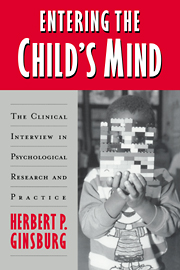Book contents
- Frontmatter
- Contents
- Preface
- Acknowledgments
- 1 The Need to Move Beyond Standardized Methods
- 2 What Is the Clinical Interview? Where Did It Come From? Why Do It?
- 3 What Happens in the Clinical Interview?
- 4 Not a Cookbook: Guidelines for Conducting a Clinical Interview
- 5 Evaluating Clinical Interviews: How Good Are They?
- 6 Toward the Future: The Clinical Interview and the Curriculum
- Appendix: Transcript of the Interview with Toby
- Notes
- References
- Index
1 - The Need to Move Beyond Standardized Methods
Published online by Cambridge University Press: 16 September 2009
- Frontmatter
- Contents
- Preface
- Acknowledgments
- 1 The Need to Move Beyond Standardized Methods
- 2 What Is the Clinical Interview? Where Did It Come From? Why Do It?
- 3 What Happens in the Clinical Interview?
- 4 Not a Cookbook: Guidelines for Conducting a Clinical Interview
- 5 Evaluating Clinical Interviews: How Good Are They?
- 6 Toward the Future: The Clinical Interview and the Curriculum
- Appendix: Transcript of the Interview with Toby
- Notes
- References
- Index
Summary
[A]ny fundamentally new approach to a scientific problem inevitably leads to new methods of investigation and analysis.
Vygotsky, Mind in SocietyHow can we discover what a child knows? Consider two different methods. The traditional approach is to investigate the child's thinking by employing tests or standard tasks. The practitioner administers IQ tests, language tests, achievement tests, and the like in a standardized fashion. All children receive the same set of questions or test items in essentially the same way. Responses are not difficult to score, and test results can easily be computed and compared. Similarly, the researcher gives all subjects the same series of tasks, each presented in a uniform fashion. The resulting behaviors can be coded with adequate reliability, and results can be quantified and analyzed with apparent precision.
The method of standardized testing is extremely influential, dominating the assessment and study of children's thinking. Indeed, this method has virtually come to define what we consider to be “scientific.” Use of the standardized method is the dominant procedure in research, as can be confirmed by even a cursory examination of journals like Child Development or Developmental Psychology, and it is the typical procedure employed in the assessments conducted by practitioners, for whom various psychological tests are indispensable tools.
- Type
- Chapter
- Information
- Entering the Child's MindThe Clinical Interview In Psychological Research and Practice, pp. 1 - 29Publisher: Cambridge University PressPrint publication year: 1997
- 1
- Cited by



